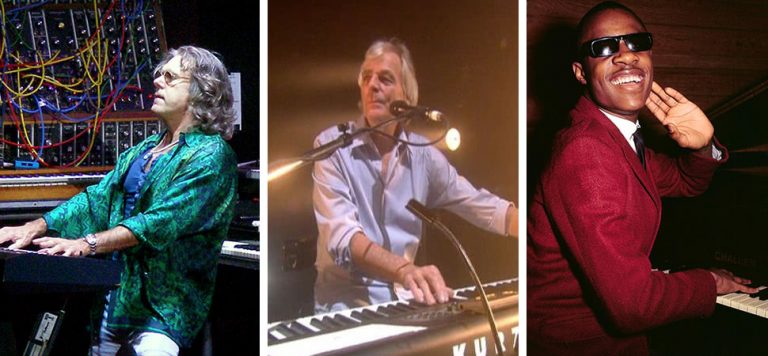Keyboard players – they of the electric pianos, Clavinets and synthesisers – don’t tend to court celebrity.
While many a singer has postured, and many a guitarist pulled faces and shredded behind their head, keyboardists tend to go quietly about their business, earning attention purely through their skills.
The lack of attention given to them is an almost criminal act, especially considering they are often one of the most important musicians in the band at times. In this case, we’ve decided to take a look back at some of the best keyboard players in music history.
Billy Preston
Schooled in gospel piano, the Texas-born Preston established himself as a prodigy of the instrument as a teenager, and his work would eventually show up on tracks by Little Richard, Sam Cooke, Ray Charles and the Rolling Stones.
Preston also has the unique honour of being the only musician credited on a Beatles recording other than the fab four for ‘Get Back’.
Ray Manzarek (The Doors)
The late Manzarek was responsible for writing most of The Doors’ music, and is credited with popularising the keyboard as pop instrument and alternative to bass guitar in the late ’60s.
Ironically, his most memorable work comes on a song he didn’t write. ‘Light My Fire’, a creation of Doors guitarist Robby Krieger, sees Manzarek negotiate a number of scales and chord progressions in a smoky, teased out solo full of ideas.
Love The Beatles?
Get the latest The Beatles news, features, updates and giveaways straight to your inbox Learn more
Richard Wright (Pink Floyd)

Wright’s keyboard playing is often lost behind Roger Waters’ lyrics and David Gilmour’s eruptive soloing in Pink Floyd.
But the textures that he derived from his keyboards in the band’s early days were otherworldly, helping Floyd stand out amongst an influx of psychedelic rock bands in late ’60s Britain. His use of effects and unconventional modes laid the groundwork for the experimentation in rock that was to follow.
Rick Wakeman (Yes)
Much like Yes’ late bassist Chris Squire, Wakeman is loved for being a virtuoso of his instrument and performing at a high standard across his career.
While he’s a fan of flowing capes and other flamboyant attire on stage, and supposedly has a razor-sharp wit, Wakeman’s skills on the keyboard, particularly as a soloist, are to be taken seriously.
Tony Banks (Genesis)
Banks is one of those musicians that doesn’t need to play fast to play well. Inspired by piano great Sergei Rachmaninoff, Banks explored the expressive possibilities of his instrument: his work inverting as adding the 4th note of a chord when playing the third inversion of a triad is one such popular technique.
Banks is one of Genesis’ chief songwriters, and his compositions are often described as “mesmerising” and sensitive to the needs of the music.
Keith Emerson (ELP)
As the lead singer and with no guitarist to steal the limelight from him, the late Emerson threw himself into the role as the prog band’s frontman. His commanding singing voice, loud outfits and maniacal keyboard playing made Emerson a hero to a generation of keyboard players, and perhaps the most recognisable keyboardist of his era
The chemistry he shared with drummer Karl Palmer and bassist Greg Lake allowed Emerson to improvise extensively during live shows and on the band’s lengthy tracks (lengthy as in 35 minutes – this is Prog we’re talking about), and the song that best captures his abilities as a musician is ‘Karn Evil 9: Second Impression’ from 1973’s Brain Salad Surgery.
Stevie Wonder
Though his talents as a songwriter and multi-instrumentalist – and the fact he’s done it despite being blind since birth – are what most people recognise about the Motown stalwart, Wonder’s key playing is, well, a wonder!
The funky tones he extracted from his Clavinet in his key ’70s works are inventive and decorated, and the keys have been the foundation of everything he does musically.
Billy Currie (Ultravox)
The ’80s saw synthesisers become the keyboard of choice for musicians, and the instrument would go on to define the genre of New Wave and much of the decade’s pop music.
If you want to hear the origins of that sound, listen to the albums Ultravox!, Ha-Ha-Ha and Systems of Romance from the mid seventies.
Currie uses ARP, Moog and Oscar synthesisers to produce soaring lead lines and string passages that inspired the next generation of keyboardists.
Jordan Rudess (Dream Theater)
The modern edition to this list is a master of many key and piano styles, from classical to ragtime to metal, and his intelligent blending of these styles makes his playing complex and highly entertaining.
One of the fastest keyboard players out there, Rudess’ talents allow him to choose the tone of any instrument on his keyboard – guitar, piano or otherwise – and make it sound as tight and technically authentic as listening to the actual instrument.



































